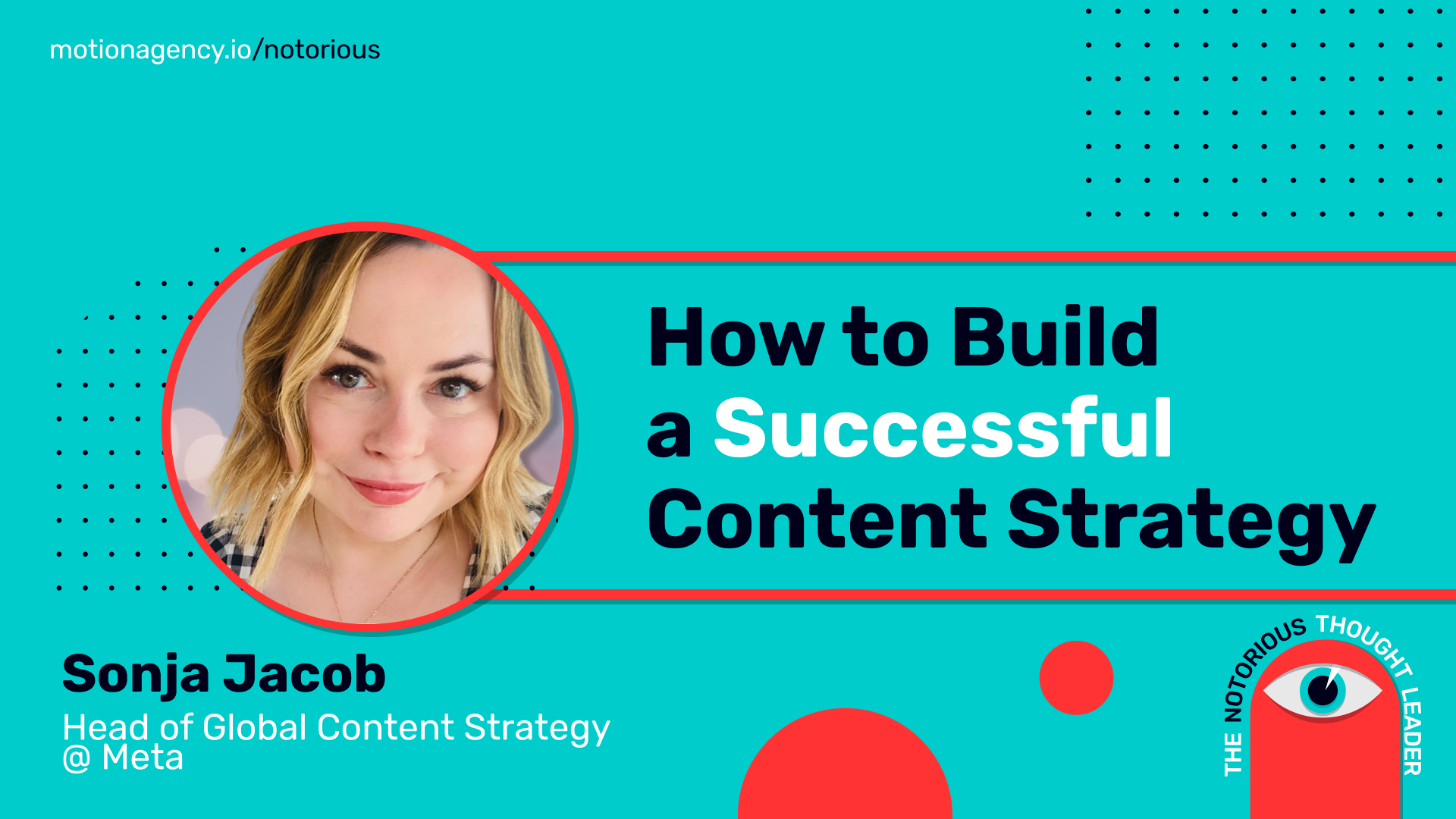Episode Summary
Thought leadership is a play for relevance, says our guest. But standing out in a highly competitive space such as B2B is a tricky endeavor. Therefore, company executives and field experts must acknowledge that becoming a thought leader is a marathon, not a sprint. And for those who are change-averse, it is better to reconsider their desire to become one.
In this episode of The Notorious Thought Leader, Sonja Jacob, the head of Global Content Strategy at Meta, joins Erin to discuss thought leadership. Sonja shares her take on thought leadership, what makes for a successful content writer, and how to build a content strategy leading to long-term success.
Guest Profile

- Name: Sonja Jacob
- What she does: Sonja is the head of Global Content Strategy at Meta.
- Company: Meta
- Noteworthy: Sonja has built a successful content marketing career working at companies like HubSpot, Kissmetrics, DocSend, Drift, Cisco, AppDynamics, and now Meta, where she focuses on the business messaging solution.
Key Insights
- Successful content writers are lifelong learners. However, as the marketing landscape changes, it forces writers to focus on the business aspect; instead of just the written word, they also have to explore new formats like video or podcasts. In addition, the larger the organization is, the more people will have a say in what the content should look like. So learning how to receive feedback and implement it is a critical skill for a content creator who wants to excel. ''One thing that's helped me is combining that love, that passion, and perspective on how to do content with a deep knowledge and understanding and continued curiosity about business and how it can be successful.''
- Thought leadership is a marathon, not a sprint. It takes time and dedication to build your reputation as a subject matter expert within your organization and in the industry. ''The consistency is huge, and that's why a lot of people shouldn't commit to doing thought leadership. You need to be comfortable with the ambiguity of long-term play. There are components to thought leadership that can yield short-term results. But I think of leadership in general as a tactic, an investment in your business that pays off way down the road and not as quickly as some folks would like.''
- We sell to businesses but primarily we sell to people. Every content creator must always keep that in mind when creating content. Yes, you want to put your product in front of the target audience's eyes, but first and foremost, you want to show them that you see and hear them and understand their needs. ''Starting with the problem with your content is an effective way for you, the content creator, to say to your audience, ‘I hear you. I see you; I know what you're going through.’ The more directly you can do that, the more of an opportunity you have to connect with people in a meaningful way.''
Episode Highlights
Sonja’s Take on Thought Leadership
”Thought leadership is a relevance play in the B2B context. You’re using thought leadership to remain relevant in this increasingly competitive space with tons of voices. […] In the B2B sales and marketing cycle, it’s not easy to get your product front and center 24/7. People don’t care, and you have to give them a reason to care. Thought leadership does that effectively.
More broadly, thought leadership is about making a commitment to having a perspective. That might start with your CMO or CEO, but then it manifests in different ways throughout your organization. So again, thought leadership is about having that differentiated opinion, but then being willing to share that across your marketing activities and your marketing channels on a regular basis.”
Events: a Strategic Driver of Thought Leadership
”One thing I see as a thought leadership play, more and more, particularly post-pandemic, is the way events can accelerate that thought leadership process. Let’s bring in all these people who are experts in a field in which we’re trying to position ourselves as experts and thought leaders. Boom! It drives credibility and accelerates that process faster than a lot of traditional content types do. […]
There’s nothing more effective if you’re starting with nothing in terms of thought leadership than bringing on experts in the space. And then, in that way, you hijack some of that clout to drive your relevance in the market.”
B2B Companies That Do Enterprise Sales Should Produce Thought Leadership
”The enterprise sales process is a long one. It involves a lot of different stakeholders; account types are complex. There are a lot of people who are weighing in on that enterprise software purchase. That’s where thought leadership can be extremely effective in converting the hearts and minds of those senior executives who are a part of a deal. […]
Traditionally, you might go to an analyst firm and hope they write about you in an upcoming analyst report. You might hope that they feature you in Gartner’s Magic Quadrant.
But what I’ve seen regularly in my enterprise experiences is that you need both. You need the Gartner to feature you and the Forrester to feature you, but you also need to be driving credible thought leadership content that speaks to the people in that deal room.
In addition, there’s this tremendous appetite for influence in the enterprise space. And I don’t think that the Gartners and Forresters of the world are filling that up at the moment. So it’s critical to bring your perspectives backed up by data and insights to complement your approach to thought leadership.”
Hiring Amazing B2B Content People Is Probably One of the Hardest Things You Can Do As a Marketer
”One of the critical characteristics of almost all the content marketers I’ve hired is a genuine and deep curiosity. For example, I didn’t go to college for business or marketing. I went to college for sociology, and I got my graduate degree in sociology, which has nothing to do with that on the surface.
But below the surface, what’s useful is that curiosity about groups of people, trends, phenomenology — and then a desire to unpack that. How do you pull together these different data inputs and sources and synthesize meaning from them?
So all the great content marketers I’ve hired have curiosity, the desire, and the skill to research — but also this inclination to synthesize meaning from those sources.
Then, tangentially related, there’s an interest in understanding business problems. How do we solve them with content? How do we use our content in a strategic way to maximize real business outcomes versus pursuing different content activities because we want to? That’s the part of the field where it’s like, ‘No, this is not a creative activity; it’s a business activity.’
And so, those characteristics are key if you’re trying to hire a content marketer.”

